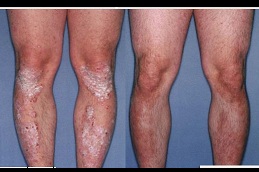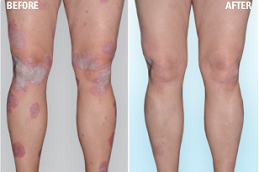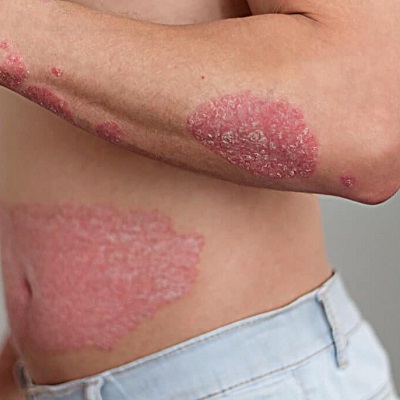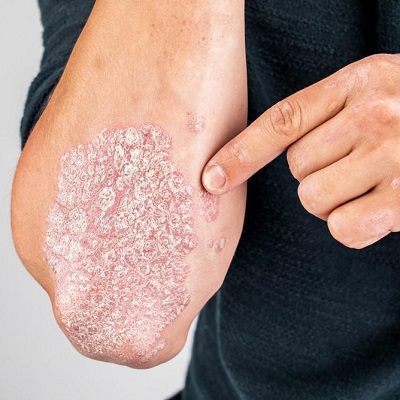
An aberrant immunological reaction causes the skin disorder psoriasis, which is marked by redness and areas of flaky, itchiness & Keloid Scars. There are still numerous myths surrounding psoriasis, which can be challenging to cure sometimes. Normally, over one month, cells that are in the deeper layers of the skin progressively climb to the surface area. The accelerated process, however, may only take a couple of days in persons with psoriasis. A result of the excess growth of new epithelial cells is elevated flakes and red areas of the skin that are frequently irritating and occasionally painful.
It is one skin disorder that is regrettably still irreversible, even though several prevalent chronic irritations have treatments. However, it is controllable with the right Psoriasis Treatment in Islamabad, Rawalpindi & Pakistan and by adhering to the doctor’s instructions on how to care for the affected area. Continue reading to learn more about it.
Results of Psoriasis Treatment:
Individuals are affected by psoriasis in varying levels of severity. The remainder of psoriasis sufferers experiences mild to extreme psoriasis, with mild psoriasis being the most common type.




What are the Types of Psoriasis?
Skin psoriasis comes in five different major varieties. The signs and symptoms help dermatologists to determine the type of psoriasis that a patient has. The specialist may examine the symptoms and signs during the examination to make either of the below diagnoses:
- Inverse psoriasis
- Plaque psoriasis
- Pustular psoriasis
- Guttate psoriasis
- Erythrodermic psoriasis
The complexity of the illness will determine how it is treated. If an individual does have psoriatic, the dermatologist will determine the extent of it and evaluate it using the criteria listed below:
- Psoriasis is referred to as mild if it affects just under 3% of the skin. Typically, individuals with such cases only have remote areas of psoriasis on their scalp, wrists, ankles, legs, and elbows.
- A moderate form of psoriasis affects between three percent (3%) and ten percent (10%) of the skin. The forearms, thighs, thorax, scalp, and other body parts may all get psoriasis.
- Psoriasis that has spread to even more than 10 percent of the total skin is referred to as severe. Psoriasis patches or blisters may cover large sections of the body, and extensive erythrodermic psoriasis can cause significant skin flaking.
What to Expect in the Consultation?
In the first appointment with the skin specialist, typically, a clinical diagnosis of psoriasis is made. Clinical diagnoses are made using a person’s medical background, physical examination, and examining signs and symptoms. A skin specialist can typically identify psoriasis just by looking at patients. If a doctor requires further evidence to check out other possible risk factors, such as skin disorders that might resemble psoriasis, a skin biopsy might be necessary.
A doctor will check the skin in a physical examination, noting any redness, flaking, or dry spots on the skin (plaques). They’ll probably pay attention to signs, placement, and pattern of these patches and also where on the skin they’re found. A specialist may also inquire about any joint discomfort patients may be experiencing and check their nails for chipping, bumps, or detachment from the nail plate, each of which is a psoriatic arthritis warning symptom.
What is the Treatment like?
There are several treatment options available from which the skin specialist or a dermatologist chooses according to the patient’s condition.
- Topical treatments: When addressing psoriasis, topical therapies, or drugs used on the affected area, are often the first line of protection. Topical medications minimize psoriasis-related irritation and slow down or normalize excessive cell growth. There are numerous efficient topical psoriasis treatments available, and most of these can be bought without a prescription (OTC). Nevertheless, certain topicals can only be purchased with a recommendation from a doctor.
- Phototherapy: Dermatologists frequently recommend phototherapy or light treatment. Under a doctor’s supervision, light therapy includes routine exposure of the infected skin to UV light. Therapies can be administered in a psoriasis facility or doctor’s office using a device that emits UV rays. Persistence is crucial to the achievement of light treatment.
- Systemic Treatments: Prescription medications known as “systemic therapies” are used to treat people with varying levels of psoriasis. Additionally, they are applied to people who are resistant to or incapable of tolerating external medications or phototherapy.
Post-care Guidelines:
The doctor provides a list of guidelines on how to care for the infected skin. These are to be followed by the patient routinely to improve their condition. Some of these guidelines are mentioned below:
- The patient is to keep their skin clean and dry to avoid the risk of infection
- Ointment prescribed by the doctor should be applied according to the prescription
- The skin is to be kept moisturized using a good moisturizer suggested by the skin specialist
- The skin is not to be scratched even if the infected skin feels itchy
- The area of the skin that is affected should be covered at night
Insurance Coverage:
Insurance providers generally cover the price of treatments that are medically important for the health and well-being of the individual. The treatment for the ailment of Psoriasis does fall under the list of medically important treatments. Thereby, it is covered by health insurance. However, to confirm the insurance coverage it is advised to talk to the insurance providers.
Cost of Psoriasis Treatment Islamabad:
The average Cost of Psoriasis Treatment in Islamabad, Rawalpindi & Pakistan ranges from PKR 2,999 to PKR 4,999. The actual cost of the therapy varies for each individual depending on the type of Psoriasis they have and how bad their current condition is. It also depends on the technique chosen by the skin specialist for the treatment. The final price of the therapy is determined by the skin specialist after considering all the variables that affect the cost of the treatment.
Book a Free Appointment!
The Glamorous Clinic has the most experienced and skilled skin specialists and dermatologists. You can get the most effective treatment for any skin ailment. The use of modern technology and techniques adopted by our doctors ensures guaranteed results. You can get a free first consultation with our experts by simply filling up the appointment form provided below and submitting it.

Dr. Asmat
Dr. Asmat is specialized in the diagnosis & management of issues of the skin. He is thoughtful in his approach toward diseases while staying alongside modernized management. He is an expert in the area of aesthetic treatments that includes rejuvenation of the skin, diminishing...
View Profile









